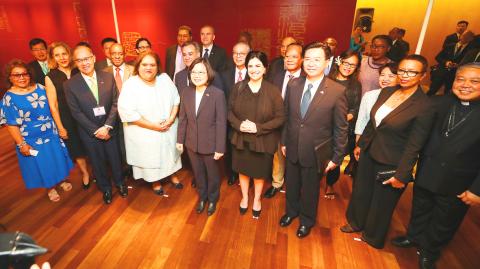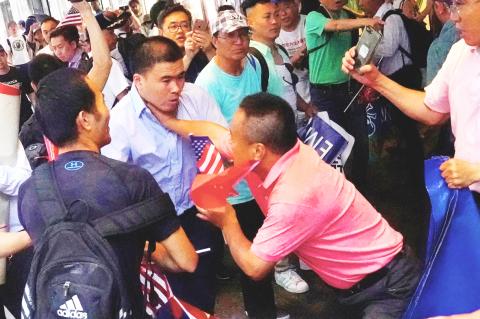President Tsai Ing-wen (蔡英文) on Thursday met with several representatives to the UN in New York, where she was making a two-day stopover en route to the Caribbean.
In a speech at the Taipei Economic and Cultural Office (TECO) in New York, Tsai addressed the representatives to the UN from the 17 countries that recognize Taiwan as a country, saying that she hoped they would continue to support the nation’s efforts to gain access to the UN.
“The 23 million people in Taiwan have the right to participate in international affairs,” Tsai said. “Their participation should not be prevented based on political interference.”

Photo: CNA
“Taiwan will not give in to intimidation,” she said, referring to China’s efforts to suppress Taiwan.
Taiwan’s allies are crucial as its pathway to the rest of the world, she added.
“Your efforts amplify the voice of the Taiwanese people, letting the whole world hear our desires,” Tsai said at the first open event at TECO New York hosted by a sitting Taiwanese president.

Photo: Reuters
Tsai arrived in New York earlier in the day for a two-night layover on her way to Caribbean, where she is to make a 12-day state visit to Haiti; Saint Vincent and the Grenadines; Saint Kitts and Nevis; and Saint Lucia.
Meanwhile, New York police broke up fights between supporters and opponents of Tsai.
Taiwanese media broadcast footage of the clashes outside the Grand Hyatt, where Tsai is staying during her stopover.
Opponents of Tsai — many waving Chinese flags — chanted slogans and fought with supporters, while one man was seen being detained and handcuffed by police.
“China is firmly opposed to official exchanges between the US and Taiwan,” Chinese Ministry of Foreign Affairs spokesman Geng Shuang (耿爽) said at a media briefing yesterday.
“We urge the US ... to not let Tsai Ing-wen pass through its territory,” he said, adding that the US should not provide a platform for “Taiwan independence separatist forces.”
With the US engaged in a trade war with China, relations between Taipei and Washington have warmed considerably.
Last week, the US Department of State approved a US$2.2 billion arms sale to Taiwan, including main battle tanks and anti-aircraft missiles, the first big-ticket military deal for the nation in years.
“Taiwan will not succumb to intimidation,” the Presidential Office said in a statement released as Tsai’s visit began, without specifically mentioning China. “All difficulties will only strengthen our determination to go out to the international community.”
Tsai was yesterday scheduled to attend a business forum and is today to meet students before heading to the Caribbean.
China has poached five of Taipei’s dwindling number of allies since Tsai became president in 2016.

US President Donald Trump yesterday announced sweeping "reciprocal tariffs" on US trading partners, including a 32 percent tax on goods from Taiwan that is set to take effect on Wednesday. At a Rose Garden event, Trump declared a 10 percent baseline tax on imports from all countries, with the White House saying it would take effect on Saturday. Countries with larger trade surpluses with the US would face higher duties beginning on Wednesday, including Taiwan (32 percent), China (34 percent), Japan (24 percent), South Korea (25 percent), Vietnam (46 percent) and Thailand (36 percent). Canada and Mexico, the two largest US trading

AIR SUPPORT: The Ministry of National Defense thanked the US for the delivery, adding that it was an indicator of the White House’s commitment to the Taiwan Relations Act Deputy Minister of National Defense Po Horng-huei (柏鴻輝) and Representative to the US Alexander Yui on Friday attended a delivery ceremony for the first of Taiwan’s long-awaited 66 F-16C/D Block 70 jets at a Lockheed Martin Corp factory in Greenville, South Carolina. “We are so proud to be the global home of the F-16 and to support Taiwan’s air defense capabilities,” US Representative William Timmons wrote on X, alongside a photograph of Taiwanese and US officials at the event. The F-16C/D Block 70 jets Taiwan ordered have the same capabilities as aircraft that had been upgraded to F-16Vs. The batch of Lockheed Martin

GRIDLOCK: The National Fire Agency’s Special Search and Rescue team is on standby to travel to the countries to help out with the rescue effort A powerful earthquake rocked Myanmar and neighboring Thailand yesterday, killing at least three people in Bangkok and burying dozens when a high-rise building under construction collapsed. Footage shared on social media from Myanmar’s second-largest city showed widespread destruction, raising fears that many were trapped under the rubble or killed. The magnitude 7.7 earthquake, with an epicenter near Mandalay in Myanmar, struck at midday and was followed by a strong magnitude 6.4 aftershock. The extent of death, injury and destruction — especially in Myanmar, which is embroiled in a civil war and where information is tightly controlled at the best of times —

China's military today said it began joint army, navy and rocket force exercises around Taiwan to "serve as a stern warning and powerful deterrent against Taiwanese independence," calling President William Lai (賴清德) a "parasite." The exercises come after Lai called Beijing a "foreign hostile force" last month. More than 10 Chinese military ships approached close to Taiwan's 24 nautical mile (44.4km) contiguous zone this morning and Taiwan sent its own warships to respond, two senior Taiwanese officials said. Taiwan has not yet detected any live fire by the Chinese military so far, one of the officials said. The drills took place after US Secretary